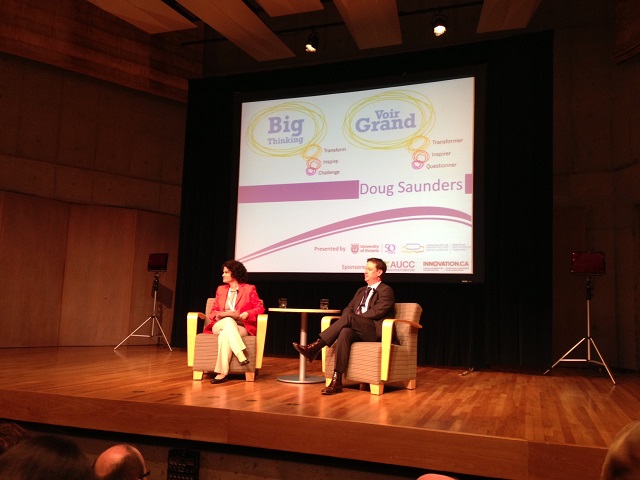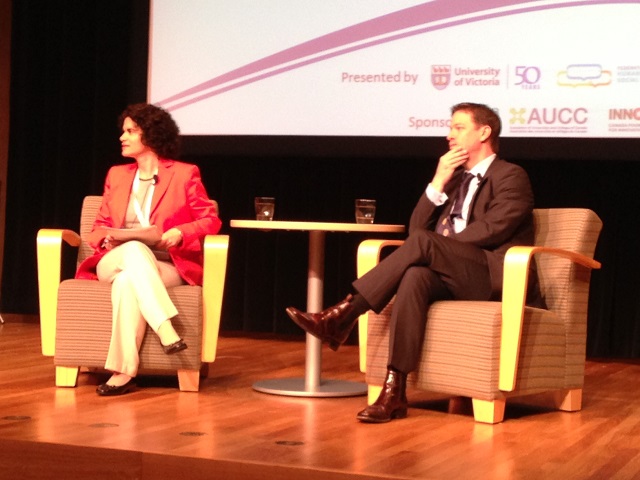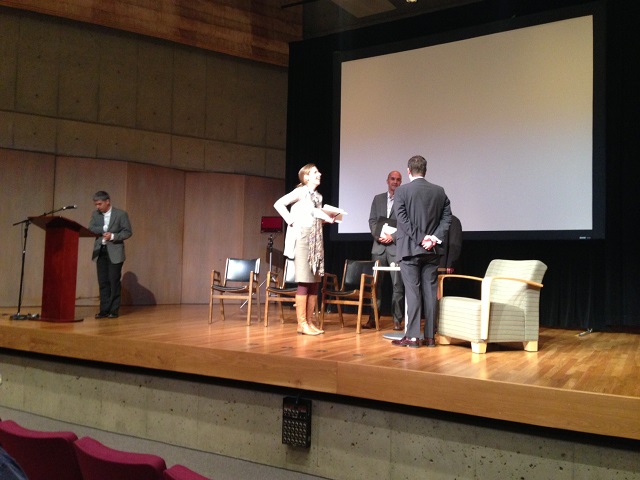Randip Bakshi http://www.twitter.com/randipbakshi
I must confess this was a session I was very skeptical about. I wondered, as Saunders wondered when writing his book, how someone who subscribes to many of these myths could be objective, let alone compassionate, in his analysis. Objectivity aside, I couldn't help but ask myself if anyone was willing to accept Saunders' criticism of the "Muslim Tide" hypothesis. We live in an age where words like extremism, fundamentalism, and Islamophobia are regular adjectives in our day-to-day vocabulary; how, then, does this book purport to counter the very myths that have largely garnered acceptance in public and media discourse? Saunders begins his talk by acknowledging that he wanted to know more about his neighbours before succumbing to prejudice, which makes this lecture and his book more believable. Why else would a well-respected journalist covering European affairs for Toronto based newspaper the Globe and Mail write about immigration and particularly, immigration from Muslim countries to the West.
As the opening remarks to Doug Saunders' talk suggest, his book is a means to bring "voices on the margins" into the limelight. He begins with an idea that came to fruition with the death of Voltaire, namely the strong criticism of Catholics and a need for separation between church and state. Amongst the earliest paranoia-inducing works, Paul Blanshard's American Freedom and Catholic Power figures as a departure point for Saunders. He argues that the mid-twentieth century saw a drastic increase in immigrants to Western Europe and North America - some of these new citizens were displaced during the Second World War, but many followed in successive stages in the era of decolonisation. Not only was there an increase in immigration, he notes, but for the first time there was large-scale migration (even providing percentages to back his claim). This immigartion resulted in a fear of newcomers as demonstrated by Blanshard's book. The "tyrannical violence and illiteracy of Catholic immigrants" was very easily associated with "terrorism" and remained a cause of considerable concern until the election of John F. Kennedy, the first Catholic President of the United States. What had begun as a propaganda project was soon forgotten with the ever-increasing Soviet threat and the Cuban missile crisis.
As history is testament, Capitalism's success story continued with the fall of the USSR. The world was mometarily a peaceful place, yet peace is always shortlived, and as though overnight the world was introduced to its next great threat: Radical Islam. Now, this is where I have serious reservations about Saunders' work. He eloquently debunks myths about Muslims procreating at a rate faster than their non-Muslim neighbours, suggests that Muhammad might not be as common a name in Britain as one news report stated, and even goes so far to say that Muslims are just as loyal as any other American, Canadian, or Brit. He fails to point out, however, that current anti-Western sentiment in the Middle East is a direct response to Western foreign policy in the region - one such instance being the coup instigated in Iran by the CIA to maintain shipments of oil for American consumption. When Iran was on its way to free, liberal, and democratic elections under the leadership of Mohammad Mossadegh, it was US intervention that placed Reza Shah Pehlavi on the defunct Qajar throne, initiating an era of outward Westernization but inner turmoil. Is it any wonder that disenchanted youth turned to the Ayatollah in search of democracy and reform? Of course, the promised reform was short-lived. Today, US drones kill thousands of Pakistanis every year in the remote and Taliban-infested Khyber-Pakhtunkhwa province. Afghanistan, Iraq, and Israel are separate chapters, if not books, in themselves. What basic vaules - liberalism, democracy, gender equality, and freedom of speech - does Saunders hold as common and universal for the West? Do those values take a backseat in non-Western or dare I say it non-White parts of the world? Many Muslims are targets of the same terrorism that targets NYC and London.
Islam, and Muslims by extension, have become much maligned monsters due to the proselytizing nature of the religion, but the same could be said about Christianity and to some extent Judaism (a fact very correctly noted by the panel and Saunders). Whether Islam is a threat or not is beyond the scope of my review, but when members of a specific community are singled out and targeted for their views, religious or otherwise, one must ask: how universal are Western values? Saunders brings up the treatment of women and homosexuals as the cornerstone to Western liberality and a factor that separates "us" (the West) from "them" (Muslims/Islam/Islamic World). Until recently, and even now, homosexuals and women face inequality across the modernized West.
Another thought-provoking point of discussion was integration, which was hotly debated at the Open Forum afterwards. How well do Muslim immigrants integrate into their new societies? Here, Saunders was both well-informed and appeared somewhat understanding of the intial difficulties in transitioning to a new environment, perhaps because of his own circumstances as a Canadian in Britain. He very compellingly argued that Muslims were the second most educated minority group in the United States, after the Jews, making their assimilation far easier than other groups (a point also noted by one of the panelists at the Open Forum). His knowledge, and one that can only come from living in that part of the world, of the nuances between different immigrant groups was beyond reproach as he pointed out that Ismailis and Alawites are easily intergrated groups, because they are themselves minority communities within Islam and considerably richer, as opposed to the Wahabis or Deobandis. Moreover, the distinction serves to illustrate that followers of more conservative movements come from the most improvished areas in their countries, thus, integrating into Western society is difficult. Needless to say, the discouragement from state authorities to include immigrants in their systems of employment and education is a factor far more visible in Europe than in North America. Saunders' elaboration of the "Republican Model" and the "Anglo-Model" of "secular shared space" during the Open Forum was inspired by his command over various facets of Islamic immigration.
As is evident, Saunders takes seriously the ideas behind these myths and offers in his words "objective and empircal" responses for people looking for answers in the wake of rising fundamentalism. I wonder, though, how many people want crunched numbers as proof? What does 73% of this or 61% of that really mean? How big are the samples? Who's doing the studies? What questions are being asked to arrive at these numbers? Although I do agree with Saunders that answers are urgently needed, for him they come from numbers stating beyond doubt that Muslims are not a threat to the West, for others it might be a slightly longer quest to arrive at the same conclusion. I am not yet wholly convinced that Saunders' work can undo systematic prejudice, but I am certain that this is a step in the right direction. In conclusion, I cannot help but come back to my inital question: Am I skeptical? The answer for now remains yes.



